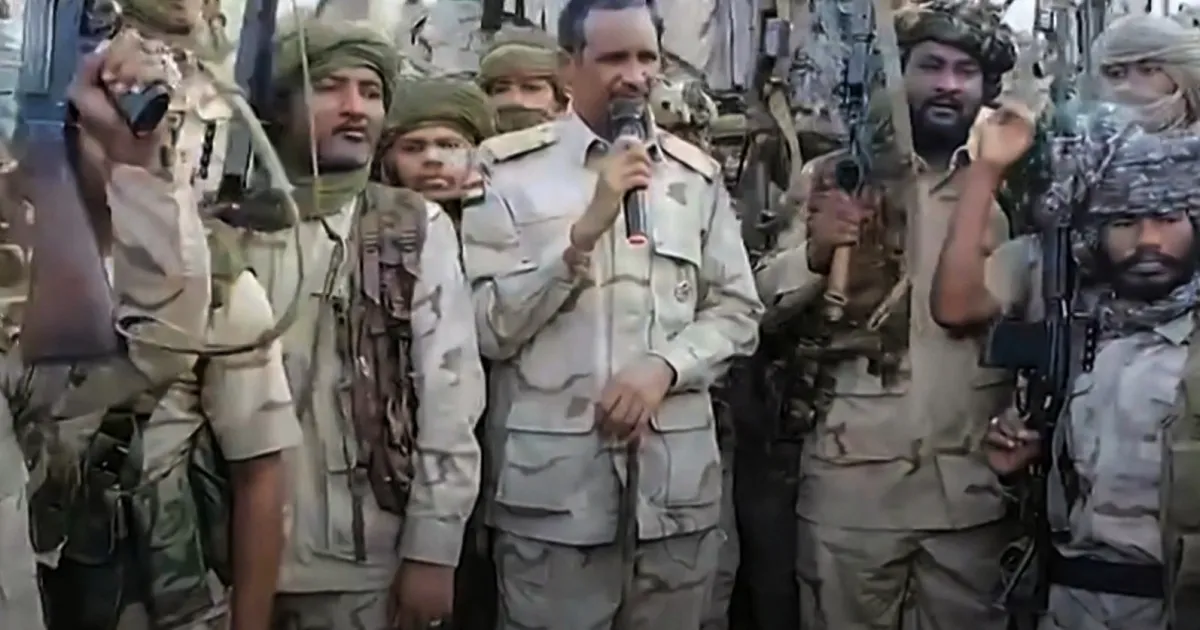
RSF militants in Sudan said they want to cooperate with a future administration, escalating concerns about split
After 20 months of civil conflict, Sudan’s Rapid Support Forces (RSF) fighters have taken the most drastic step toward a country-wide division by announcing that they will cooperate with a proposed new government to manage areas under their control.
Since April last year, the RSF has been engaged in combat with the national army, and it currently holds swaths of central and western Sudan, including the Darfur region, which has historically served as its base, and the majority of the capital, Khartoum.
The globally acclaimed and army-led national government, which was driven from Khartoum last year and is currently based in Port Sudan on the Red Sea coast, will face opposition from any new administration that rules that region.
Members told Reuters this week that armed group commanders and civilian lawmakers have reached an agreement to establish what they call a “peace government.”
The government in Port Sudan, which they claimed was extending the conflict, would be replaced with a civilian-led organization that is independent of the RSF.
As reported by Reuters this week, three high-ranking Sudanese political sources said the RSF had collaborated with the politicians to build the administration. The RSF stated that it would cooperate with the proposed administration but not dominate it and that it currently had no connections to the government.
“We in the RSF will only carry out the military and security role, but governing will be undertaken by civilian forces independently,” the statement told Reuters on Sunday also stated.
There were no specifics on the potential start date of such an administration, or how it would select representatives, run, or raise money. It will be headquartered in Khartoum, according to group members.
Both the army, which is reclaiming territory in the center of the country and dominates the north and east, and the administration in Port Sudan did not immediately reply to messages requesting comment. Both have previously claimed to be the only national authority and charged the RSF and its supporters with conspiring to devastate the nation.
According to Western diplomats who spoke to Reuters, the RSF would exercise control over any new administration that was discussed.
On Monday, one Western official told Reuters, “I see no one rushing to recognize them.”
“The lack of an effective chain of command is the RSF’s greatest flaw. How can a government be responsible for all the tragedies we witness?
Rights organizations and the United States have reported crimes by both sides and charged the RSF with ethnic cleansing in Darfur. Every charge has been thrown out by both parties.
“MAXIMALIST CLAIMS IN TERRITORIAL
“Any such new administration would be a step backwards,” stated Tom Perriello, the U.S. Special Envoy to Sudan, last week.
“There are different things it could be, all of them bad, from government-in-exile to ‘we are the government’ to ‘we are the government over the territory that we stand in,'” he said to reporters in London.
Officials who served in the civilian-military power-sharing government that governed Sudan for two years following the overthrow of long-ruling President Omar al-Bashir in 2019 are among those in the group who said they were forming a new government.
According to the political sources, several of the participants would acquire some degree of power in a body supported by the RSF, even though they lack significant constituencies or significant active forces on the ground.
Mohamed al-Taishi, Alhadi Idris, and al-Tahir Hajar, former members of the Sovereign Council, confirmed their involvement to Reuters.
Suleiman Sandal, leader of a Justice and Equality Movement faction, and politician Ibrahim al-Mirghani were among the others.
“The group in Port Sudan does not aim to have peace and refuses all initiatives to end the war,” Taishi indicated on Monday.
Idris cited recent actions to introduce new banknotes and administer exams in areas controlled by the army as evidence that the Port Sudan government was “using its assumed authority… to divide the country through illegal unilateral moves.”
In the midst of all the discussion, the war that broke out as a power struggle between the army and the RSF has left 12 million people displaced, killed tens of thousands, and caused severe famine and sickness.
According to rights organizations and international observers, peace negotiations have stalled and both parties have kept using their foreign sponsors to get weapons.
“Each belligerent has their own set of tools, and they’re employing them without restraint, sticking to their maximalist territorial claims,” Jalel Harchaoui, an associate fellow at the Royal United Services Institute in London, stated on Tuesday.
“This stubbornness, combined with unbridled foreign interference, may well result in partition.”
All Categories
Recent Posts
Tags
+13162306000
zoneyetu@yahoo.com



